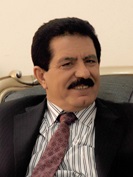
Jalal Talabani was an Iraqi politician who served as the sixth president of Iraq from 2005 to 2014, as well as the president of the Governing Council of Iraq. He was ethnically Kurdish.
Events in the year 2005 in Iraq.
The following lists events that happened during 2006 in Iraq.

Tuz Khurmatu is the central city of Tooz District in Saladin Governorate, Iraq, located 55 miles (89 km) south of Kirkuk. Its inhabitants are predominantly Shia Turkmen, with a minority of Arabs and Kurds.
The 2007 Kirkuk bombings were a series of 3 suicide and car bomb attacks that occurred on July 16, 2007, in the northern Iraqi oil city of Kirkuk. The bombing killed 86 people with up to 180 injured.

Parliamentary elections were held in Iraq on 7 March 2010. The elections decided the 325 members of the Council of Representatives who would elect the prime minister and president. The elections resulted in a partial victory for the Iraqi National Movement, led by former Interim Prime Minister Ayad Allawi, which won 91 seats, making it the largest alliance in the Council. The State of Law Coalition, led by incumbent Prime Minister Nouri Al-Maliki, was the second largest grouping with 89 seats.
Events in the year 2009 in Iraq.
The 20 June 2009 Taza bombing was an attack which took place in Taza near Kirkuk, Iraq on 20 June 2009 in a dominant Shia Turkmen community. At least 73 people were killed and over 200 more were injured. Thirty homes were destroyed in the bombing.

Kosrat Rasul Ali is a Kurdish politician and the leader of the Supreme Political Council of Patriotic Union of Kurdistan (PUK), veteran Peshmerga military leader, former Prime Minister, and former Vice President of the Kurdistan Region.
2006 in Iraq marked the onset of sectarian war, making it the deadliest year of the war.

This article details major terrorist incidents in Iraq in 2008. In 2008, there were 257 suicide bombings in Iraq. On February 1, a pair of bombs detonated at a market in Baghdad, killing 99 people and injuring 200. Two other particularly deadly attacks occurred on March 6, and June 17.
Events in the year 2010 in Iraq.
Events in the year 2011 in Iraq.

The Iraqi insurgency was an insurgency that began in late 2011 after the end of the Iraq War and the withdrawal of U.S. troops from Iraq, resulting in violent conflict with the central government, as well as low-level sectarian violence among Iraq's religious groups.
The following lists events in 2012 in Iraq.
The following lists events that happened during 2014 in Iraq.
The following lists events the happened in 2013 in Iraq.
This is a timeline of events during the War in Iraq in 2015.
The 2005 Erbil bombing was a suicide attack on the offices of Kurdish political parties in Erbil, Kurdistan Region, on May 4, 2005. The attacker detonated explosives strapped to his body as people lined up outside a police recruiting center in Erbil. Ansar al-Sunna claimed responsibility. This attack is an example of religious terrorism, groups who commit terrorist acts because of religion believe that their deity or deities are on their side and that their violence is divinely inspired and approved. This attack is also an example of Strategic terrorism. Which is a form of terrorism where the terrorist plans to inflict mass casualties. The goals of Strategic terrorism are normally not local objectives but global objectives or regional objectives. Ansar al-Sunna's goal is to transform the country of Iraq into an Islamic state so their goals are regional.

Bafel Jalal Talabani, known as Bafel Talabani, is an Iraqi Kurdish politician and current leader of the Patriotic Union of Kurdistan (PUK). He is the older son of former PUK leader Jalal Talabani.







